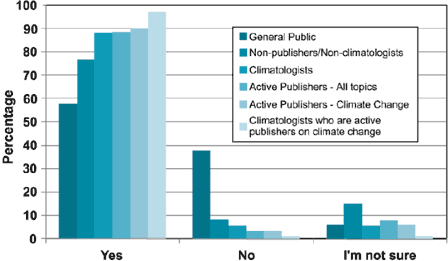The growing divide between climate scientists and public opinion
Posted on 4 September 2009 by John Cook
A conference of global warming skeptics is scheduled for May 2010. They plan to examine the "growing divide between what science has to say about the causes, scale, and consequences of climate change, on the one hand, and what politicians and the media say on the other hand". This is an important and illuminating topic. One hopes (rather futilely) that the agenda will include the paper Examining the Scientific Consensus on Climate Change (Doran 2009). The authors surveyed 3146 earth scientists, asking them the following survey question:
Do you think human activity is a significant contributing factor in changing mean global temperatures?
What is most interesting is that the authors categorised the scientists based on their level of expertise in climate science. For example, those considered the most qualified were climate scientists who had more than 50% of their peer-reviewed publications in the past 5 years on the subject of climate change. The results are shown in Figure 1:

Figure 1: Response to the survey question "Do you think human activity is a significant contributing factor in changing mean global temperatures?" General public data come from a 2008 Gallup poll.
What they find was as the level of active research and specialization in climate science increases, so does agreement that humans are significantly changing global temperatures. Most striking is the divide between expert climate scientists (97.4%) and the general public (58%). The paper concludes:
It seems that the debate on the authenticity of global warming and the role played by human activity is largely nonexistent among those who understand the nuances and scientific basis of long-term climate processes. The challenge, rather, appears to be how to effectively communicate this fact to policy makers and to a public that continues to mistakenly perceive debate among scientists.































 Arguments
Arguments























 0
0  0
0






Comments